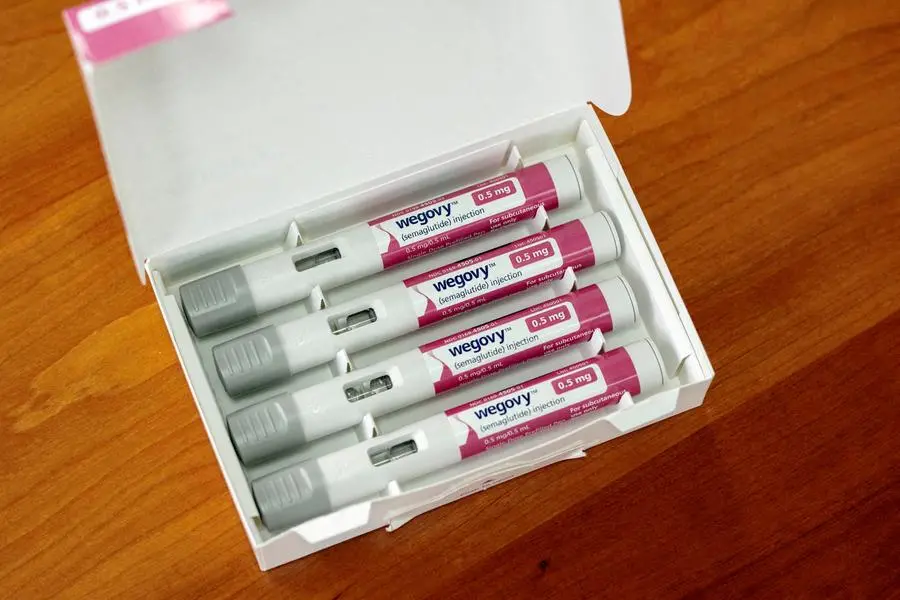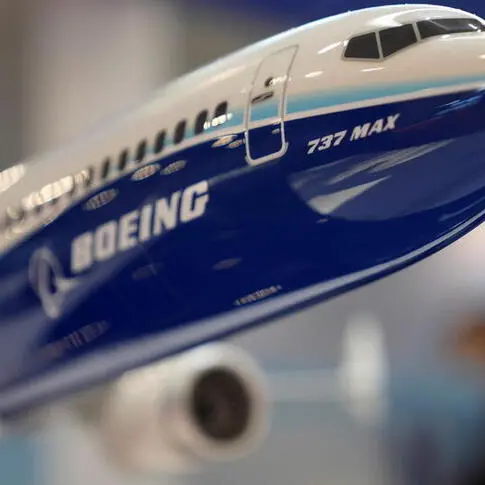PHOTO
LONDON - Weight-loss drug Wegovy helped Rebecca Vogt achieve a major goal - shedding the weight she had not managed to drop since giving birth. But, after a particularly brutal day in the bathroom suffering from vomiting and diarrhoea, she called it quits.
"The nausea is just so awful with this medication," said Vogt, who had endured daily sickness for months.
After stopping taking the weekly injection, Vogt, a 48-year-old customer service representative in Buffalo, New York, said she regained the 27 pounds (12.2 kilograms) she had lost.
Though extreme, Vogt's experience on Novo Nordisk's hugely popular drug is not unique. Some 44% of patients taking the weekly injection experienced nausea and 30% experienced vomiting, according to prescribing information - the guidance for healthcare professionals approved by the U.S. health regulator, the Food and Drug Administration (FDA).
"If there was a drug like Wegovy without the nausea side effects, I would love to take it," Vogt said.
Some U.S. and European biotech companies are hoping to offer an alternative to Vogt and other people suffering side-effects.
More than a dozen small, privately-owned companies are developing drugs that hold the promise of Wegovy-like weight loss without the downside of nausea, according to U.S. investment bank Stifel, which published reports in March and July on the obesity market.
These experimental drugs function slightly or entirely differently than the class of drugs like Wegovy, which work by mimicking the GLP-1 gut hormone that reduces appetite. For this reason, they appear to avoid the side-effect of nausea, according to interviews with executives from three of the companies.
Some of these companies have been working on their drugs for years. Executives from four of them told Reuters the huge amount of attention the obesity market is receiving due to Wegovy's success could be a game-changer for their own drug development prospects.
They said the boom in interest is putting them in a more favourable position to raise funds from potential investors, as they seek a slice of a market estimated to be worth as much as $100 billion by the end of the decade.
"The attention is very welcome," said Jayson Dallas, chief executive of Rivus Pharmaceuticals in the United States. His company, founded in 2019, is developing a drug that disrupts the body's mitochondria, affecting energy consumption, so that a person taking the drug would lose weight if they eat the same amount of food.
Investors are taking note of the demand from people like Vogt.
"The next frontier of obesity treatment would be to achieve Wegovy or Mounjaro-like efficacy with less side effects and less muscle mass loss," said Noushin Irani, a portfolio manager at Deutsche Bank's asset management unit DWS, which had 841 billion euros ($914.34 billion) under management as of end-March.
Mounjaro is Eli Lilly's obesity drug. The company said in April that it expects the drug to be approved as an obesity treatment by the FDA as early as late 2023. It leads to 22.5% weight loss, according to a Lilly trial published last year.
MULTIPLE APPROACHES
Originally developed to treat type 2 diabetes, the glucagon-like peptide-1 (GLP-1) receptor agonist drugs - like Wegovy - mimic a gut hormone that suppresses appetite, promoting the feeling of fullness. The effect achieves far more weight loss than predecessors.
First-to-market Wegovy, which launched in the U.S. in June 2021, leads to an average weight loss of 15% when combined with changes in diet and exercise.
Novo, Lilly and other big drugmakers including Pfizer have said they are working on a second generation of weight-loss drugs that improve on Wegovy and Mounjaro by offering pills instead of injections or by potentially leading to greater weight loss.
But these drugs are GLP-1s and still cause nausea, according to data the companies separately published in May from mid- and late-stage trials.
Some investors say biotech companies have an opportunity.
"There is room for multiple approaches. Individuals and their physicians will see what works best for them," said Andrew Levin, managing director at RA Capital Management, a U.S. investment firm focused on healthcare with $9.65 billion under management.
The group led a $132 million Series B funding round that closed last September for Rivus.
Rivus said its main drug in development, HU6, showed in an early, eight-week "proof of concept" study to cause weight loss comparable to the GLP-1 drugs while sparing muscle mass and avoiding nausea. Results of two Phase II trials of HU6 are expected next year.
If that trial data is good enough, Rivus will consider an initial public offering (IPO) depending on market conditions, Dallas, the CEO, said.
Another U.S. biotech taking a different approach that has proven in early trials to achieve weight loss without nausea is Glyscend Therapeutics, born out of a lab at Johns Hopkins University in Baltimore, Maryland.
The company in May published preliminary data from a Phase IIa trial showing the effective weight loss; the data also indicated the drug was "well-tolerated". Glyscend's chief scientific officer Mark Fineman said in an interview that the trials showed "only mild nausea and gastrointestinal side effects that are short-lived" and disappeared within a day.
"We have a lot of options from a financing and partnering perspective, which did not exist even a few years back," CEO Ashish Nimgaonkar said in the same interview.
The company is well capitalised but Nimgaonkar said he was optimistic the interest in the obesity market would help in future fundraising as it advances the drug development process.
Glyscend may consider an IPO if the market improves or a partnership with a big pharma firm for Phase III trials, he said.
An even earlier stage biotech firm, Antag Therapeutics in Denmark, told Reuters that the ballooning obesity market has improved its fundraising prospects.
Antag's CEO Alexander Sparre-Ulrich told Reuters that the company hopes to close a Series A funding round of 30 million euros by the end of 2023, to begin its Phase I clinical study.
And another European biotech company, Switzerland-based Aphaia Pharma, in May launched its Phase II clinical trial of its daily glucose formulation, which is taken mixed with water. It curbs appetite by restoring the natural release of GLP-1 and other hormones, without causing nausea, Phase I data showed.
The effect of the drug on weight loss is being tested in the Phase II study. Results are expected next year.
"It's absolutely possible that in 5 to 10 years we'll see over a hundred biotechs working in this area," said Tim Opler, a Stifel investment banker. Opler said Stifel is not currently an investor in any of the biotech firms cited in their reports.
($1 = 0.9198 euros)
(Reporting by Maggie Fick; Editing by Josephine Mason and Daniel Flynn)





















